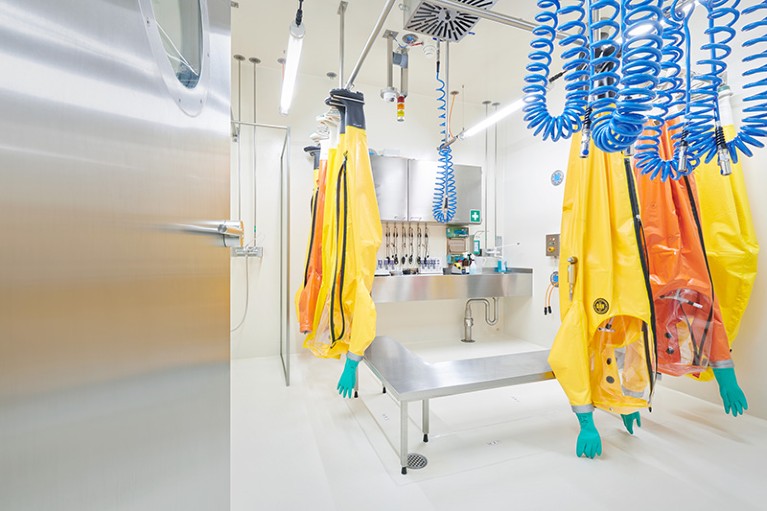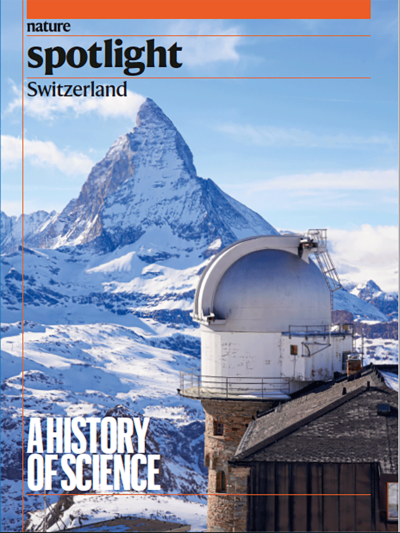[ad_1]

Hulda Jónsdóttir wears inflatable protective suits like these to study lethal viruses.Credit: Spiez Laboratory
Virologist Hulda Jónsdóttir studies some of the world’s most pathogenic viruses at the Spiez Laboratory in Spiez, Switzerland. For her, highly pathogenic viruses are more often a source of curiosity than of concern. Jónsdóttir, who runs a research group at the Spiez Laboratory, regularly dons a giant, inflatable protective suit to research disinfectants and antiviral compounds to combat several lethal viruses, including Ebola virus and Lassa virus. Jónsdóttir spoke to Nature about carving her own path in virology research and why she chose to pursue a career in Switzerland and at the Spiez Laboratory, which is owned and funded by the Swiss government.
Why do you study lethal viruses?
I’ve always been fascinated by viruses. They comprise barely anything, yet they have such a big impact on living organisms. Most of the viruses my lab and I study are highly pathogenic and lethal, such as Ebola virus, Lassa virus, Nairovirus and Nipah virus. Because these are all so lethal and don’t have vaccines or cures, they’re considered biosafety level (BSL) four. I have to wear a big inflated suit that’s attached to an air supply outside the room when I conduct my experiments.
What are you working on now?
My colleagues and I just started a three-year project to develop a model for testing antivirals against Nipah viruses, which are respiratory viruses that cause encephalitis. I also do disinfection studies for highly pathogenic viruses. Right now, we are looking at how effective homemade soap is as a disinfectant for Lassa virus, which is endemic in Nigeria as well as some other countries in West Africa.
What led you to your position at the Spiez Laboratory?
After I finished my PhD in virology at the Swiss Federal Institute of Technology (ETH) in Zurich in 2016, I stayed in the lab for a year as a postdoctoral researcher. By that point, I wasn’t sure whether I wanted to stay in science. Then I saw an advertisement for a two-year postdoctoral placement in respiratory toxicology at the University of Bern. I thought that the experience would help me determine whether I was tired of science as a whole or just feeling disillusioned with my current environment because I had been there for so long. There, I realized that I still liked doing science and that I missed virology research.
Two years later, I saw a postdoctoral job at the Spiez Laboratory to study an experimental Ebola vaccine. The project required BSL-4 work, which was something I had dreamt of doing since I started working in respiratory virology. I decided to apply for the position. It’s been five years, and I’m still here.
How does the Spiez Laboratory differ from academic labs?
We’re a government institution, and part of the Swiss Federal Office of Civil Protection. In the biology department, we have governmental mandates to do research that is relevant to Swiss civil protection, although of course we can focus on other topics as well. I do a lot of applied research that benefits the public, such as trying to find antiviral drugs against infectious diseases. We also collaborate with the military by training soldiers for biological civil protection twice a year. During the COVID-19 pandemic, soldiers helped personnel from the Spiez Lab to run diagnostic tests for COVID-19.
Nature Spotlight: Switzerland
Along with research, we run a regular diagnostic service for hospitals and doctors who send samples to us to be tested. Unlike an academic lab, you need security clearance to work here.
How did the COVID-19 pandemic affect your research?
I started working on coronaviruses during my PhD, so I had a lot of experience with them by the time the pandemic hit. I was doing my BSL-4 training at the Spiez Laboratory when I first heard about COVID-19. At the time, I felt frustrated because I was progressing in my career and then got pulled back into coronavirus research. But I had to figure out how to research SARS-CoV-2 or my lab would have been shut down. By the middle of 2020, I was constantly being contacted by researchers to do antiviral drug tests, and by the military to do serological tests of soldiers. My colleagues and I analysed soldiers’ responses to the virus and estimated the percentage of asymptomatic people. Doing COVID-19 research was very chaotic for a while; everybody wanted results immediately. But in a way, I was grateful that I could still go to work, even if it was crazy busy. As a foreigner, I was far away from my family, so it was difficult being so isolated.
Why did you decide to stay in Switzerland?
I grew up in Iceland and always wanted to study abroad. I came to Switzerland 12 years ago and was planning on staying only for my PhD. But I kept ending up in good places with good people where I felt supported and inspired.
As superficial as it sounds, it’s also about the money. Switzerland invests a decent amount of money in science, and I’ve been fortunate to be part of projects that are already funded or easy to get funding for.
But I don’t think people always talk about how hard it is to move to a new country. When I first arrived in St Gallen, Switzerland, in 2012, I felt isolated because I didn’t know the language and had a hard time making friends. In January 2014, I moved to Bern, which was much better because there were more people around and I liked the city. I also joined an English-speaking theatre group called the Caretakers. I met a lot of people, some of whom are now my best friends. One big issue when you go abroad to do science is that a lot of your peers leave after their contracts end, so your friends become scattered around the world. My theatre group has been more constant; it’s been a lifesaver for me.
Any advice for early-career scientists?
It’s important to rest sufficiently if you want to do good research. The system is geared towards you working as much as possible, but you just end up burning out. If there’s anything I can recommend, it’s having more holiday time. In Switzerland, I have five weeks of holidays, four of which are legally mandated. But I recognize that I’m immensely privileged to be able to take so much time off. It’s not always possible, depending on someone’s financial situation, lab environment or the country they live in.
Academic culture often puts so much pressure on PhD students and postdocs that it squeezes them until there’s nothing left, which is something I’m heavily against. As a group of researchers, I think we should work towards changing that culture, in part by lobbying for more time off. As an individual, even if you can’t travel or take large chunks of time away from the lab, you can still put some distance between yourself and your job. For instance, if you’re working from home on a Friday, close your computer at five and put it in a different room. Just having a little bit of space helps you to work better.
This interview has been edited for length and clarity.
This article is part of Nature Spotlight: Switzerland, an editorially independent supplement. Advertisers have no influence over the content.
[ad_2]
Source Article Link


